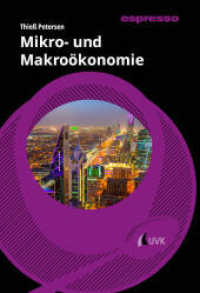Full Description
Service-learning is an exciting pedagogy and field of study, offering insight into how academic study and community engagement blend to create social change. In its most traditional conceptualization, servicelearning activities typically manifest within communities where outside individuals address a need. Service learning is purported to have a transforming effect on individual student perspectives by providing students the opportunity to interact with people and enter into situations that allow students to test their predisposition towards others. However, the literature on the impact of service-learning on participants' acceptance of diversity and development of open-mindedness reports mixed outcomes.
The purpose of this book is to explore cultural tensions and dynamics within the field of service-learning. It is not meant to be an exhaustive review of the interplay between culture and service learning, but rather a starting point for an ongoing conversation about how this complex topic impacts the field. In 18 chapters, educators, students, and administrators investigate the cultural values of service-learning itself and the tensions created when this is at odds with the values of others within K-12 and higher education in the United States and abroad. Authors include community organization representatives, researchers, directors of offices of community engagement, university administrators, junior and senior faculty, and former service-learning undergraduate students. Submissions reflect a range of genres, including theoretical / conceptual pieces, position papers, case studies, and other traditional academic essays, challenging how students and community members are affected by the cultural tensions within service-learning engagement.
Contents
Foreword; Paul C. Gorski.
Preface; Trae Stewart & Nicole S. Webster.
Part I. Supportive Frameworks & Challenging Ideologies/Paradigms.
Chapter 1. Engaging Culture: Ethnography as a Model for Service-Learning Practice; S. Ashley Kistler.
Chapter 2. Moving Beyond the Dominant: Service-Learning as a Culturally Relevant Pedagogy; Jennifer Gilbride-Brown.
Chapter 3. Challenging Privileged Paradigms Through Service-Learning: Exposing Dominant Ideology, Unlearning Deficit Thinking, and Debunking the Myth of Meritocracy; Annemarie Vaccaro.
Chapter 4. Relational Knowledge Production and the Dynamics of Difference: Exploring Cross-Cultural Tensions in Service-Learning Through Narrative; Nicholas S. Mariner, Jessica Nina Lester, Katharine Sprecher & Allison Daniel Anders.
Part II. Novel Approaches, Noted Impacts & Noteworthy Lessons.
Chapter 5. Diversity and Service-Learning: Finding Common Ground Through Social Justice and Mindfulness; Catherine Mobley.
Chapter 6. Cultural Dynamics and Tensions Within Service-Learning in a Community Health Nursing Course; Ardith Sudduth, Evelyn Wills, & Jill Laroussini.
Chapter 7. The Effects of Service-Learning on White College Students' Racial Attitudes: Implications for Achieving Better Outcomes; Christopher G. Wetzel, Lucy A. Waechter Webb, Anita A. Davis, & Maureen E. Miller.
Chapter 8. Teaching Lessons of the Holocaust Through Service-Learning; Ruth T. Hannon & Joel P. Litvin.
Chapter 9. Teaching - A Job, A Lifestyle, A Story: Possibilities and Limitations of an Intergenerational Oral History Project; Kristi Richard Melancon.
Chapter 10. A Preliminary Evaluation of Cultural-Based Service-Learning: Characteristics of Cultural- and Academic-Based Service-Learners; Lori Simons, Lawrence Fehr, Nancy Hirshinger-Blank, Elizabeth Williams, Cassandra Dry, Courtney Carlin, Lisa Marie Curran, Jennifer Gensler, Shanay Rowe, & LaToya Wright.
Chapter 11. Revitalizing the Land Grant Mission in the South: One University's Path to Civic Engagement via Community Schools; Robert F. Kronick, Nissa Dahlin-Brown, & D. Gavin Luter.
Chapter 12. Service-Learning Pedagogy: A Method for Improving the Education of Latino Students in Charter Schools; Nicole S. Webster & Centrice Martin.
Part III. Successful & Missing Opportunities in Teacher & Counselor Education.
Chapter 13. Preservice Teachers Explore Pedagogy & Service-Learning in a Place Called New Orleans East: Assumptions, Tensions and Innovation in a Post-Katrina Charter School; Margaret-Mary Sulentic Dowell.
Chapter 14. "Service Is the Rent We Pay": A Tale of How Three Teacher Educators Studied Our Own Practice Through Engaging Pre-Service Teachers in a Multicultural Service-Learning Experience; Kristal T. Moore Clemons, Heather Coffey, & Sara B. Ewell.
Chapter 15. Exploring Cultural Dynamics of Self-Other Relations: University Faculty and Students Engage in Service-Learning with Refugees; Antonina Lukenchuk & Erika Barber.
Chapter 16. Gay, Lesbian, and Bisexual Issues in Counselor Education: The Potential of Service-Learning in the Development of Sensitive and Competent Mental Health Professionals; Trae Stewart & Ximena Mejia.
Part IV. Global Considerations & Local Implications.
Chapter 17. Intercultural Conflicts Within International Service-Learning: Reflections on Barbados; Norma Gaines-Hanks & Nyasha Grayman-Simpson.
Chapter 18. Whose Project Is It Anyway? The Case of Waste for Life, Argentina; Caroline Baillie, Eric Feinblatt, & Jens Kabo.
About the Editors.
About the Contributing Authors.







